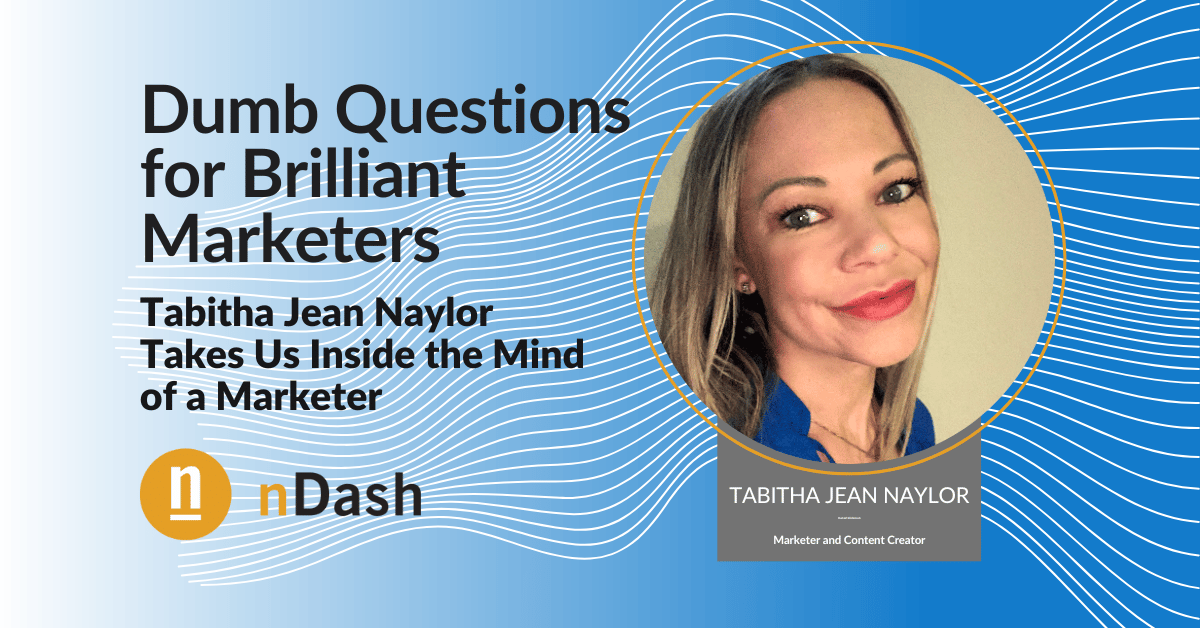We’re back with another interview as part of our Inside the Mind of a Marketer series. This time, nDash’s Managing Editor, Jenn Greenleaf, talks to Tabitha Jean Naylor, self-proclaimed digital marketing ninja, about all things marketing.
Jenn: Can you tell us about your background and how it led you to become a marketer?
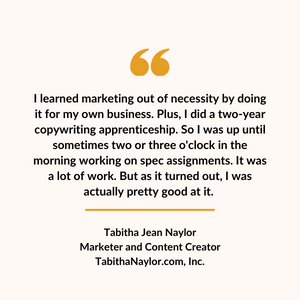 Tabitha: My background is it’s kind of interesting. I didn’t set out to be a marketer.
Tabitha: My background is it’s kind of interesting. I didn’t set out to be a marketer.
When I graduated from college, I planned on going to grad school at the University of Pitt. I was gearing up to get my MBA and a master’s in global political economics, specializing in Latin America, which sounds amazing. So, I moved to Pittsburgh and got a job working at PNC Bank in their mortgage department.
Then my student loans stuff started to come in. I was very fortunate as an undergrad, I had an academic scholarship. So I didn’t graduate with much by way of student loans. When everything started to come in for grad school, I wasn’t sure if I wanted to be over $100,000 in debt by the time I was 24.
So I ended up deferring my admission to grad school, kept working at PNC Bank, and got a job transfer to Philadelphia. In 2005, I got my broker’s license and went out on my own. So, instead of just doing sales, now I have a business and have to do sales and marketing.
In a major metropolitan market like Philadelphia, to do good marketing or good advertising, a marketer really needs deep pockets. I had some money set aside, but not what I feel you would need to have set aside to really make a dent in that type of market.
So that’s how I learned how to be a marketer. I learned marketing out of necessity by doing it for my own business. Plus, I did a two-year copywriting apprenticeship. So I was up until sometimes two or three o’clock in the morning working on spec assignments. It was a lot of work. But as it turned out, I was actually pretty good at it.
Jenn: What inspired you to start your own marketing firm?
Tabitha: What kind of inspired everything was I decided that I was going to do some direct mail pieces. I saw what the companies were sending to me samples, and I hated all of it. I thought, “I think I can do better.” So, I threw the gauntlet down. I was like, “Challenge accepted. I know I can do better than this!”
In 2008, the writing was kind of on the wall. Everybody knew that the bottom was going to fall out of the real estate market. It just wasn’t sustainable in its current format. So I just kind of took a step back and said, “You know, is this something that I want to do for the rest of my life?”
I’m really big on self-reflection and removing myself from a situation and saying, “Is this something sustainable?” Or “Does this make sense?” That’s what happened when I decided to defer my admission to grad school, and it’s kind of what happened here.
I was so burned out from doing mortgages. It was just like in the movie Boiler Room. It was just it was chaos and long hours. You’re trying to churn out as much as you can and make as much money as you can because you know there’s no way it’ll last forever.
I thought to myself, “I don’t think I want to ride out what’s coming next.” I actually got out of the mortgage industry right before the bottom fell out. And I thought, “There’s going to be an influx of people exactly like me. I’d rather just get ahead of the curve.”
I didn’t want to be one of these mortgage people that, when HR managers look at your resume, roll their eyes and groan. So my goal was to try and be proactive and get ahead of the curve.
Jenn: What was your next step? Did you work as a marketer for another firm or launch your company?
Tabitha: I got out of the business and took a job doing sales and marketing for a media company. That was very niche. I worked with the Department of Defense and all the major defense contractors. I was working on print publications and doing sales and marketing for them.
It was a cool job because I traveled all over the United States. I was going to military bases and trade shows. It was exciting for somebody in their 20s, right? Because you’re like, “Oh, this is so cool! They’re paying me to travel. I get to talk to and hang out with really smart people and learn about all these crazy technologies.”
So, it was exciting for me. But after a good six to eight months, the novelty of it kind of wears off. You’re literally home for a day taking your dirty stuff out, throwing your clean stuff in, and then, boom, you’re on the road again.
I had dogs at the time, and I missed them tremendously. It starts to weigh on you after a while, but a long story longer is – word got out that I was pretty good at marketing.
Jenn: Word of mouth is powerful – can you tell me about this part of your journey as a marketer?
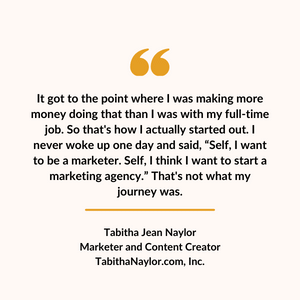 Tabitha: So I started getting the small and medium-sized defense contractors who were like, “Hey, can you help us with some marketing collateral? Can you help us with some press releases?”
Tabitha: So I started getting the small and medium-sized defense contractors who were like, “Hey, can you help us with some marketing collateral? Can you help us with some press releases?”
It got to the point where I was making more money doing that than I was with my full-time job. So that’s how I actually started out. I never woke up one day and said, “Self, I want to be a marketer. Self, I think I want to start a marketing agency.” That’s not what my journey was. It was just kind of something that I happened to be good at. That people knew I was good at.
I was able to start bringing business in that way. It was nice because I wasn’t traveling anymore. I kind of got the travel bug out of my system. Now I get to be home. And within six months, I had so much coming in, and I had no choice but to start bringing people on board to help out.
That’s been my journey in terms of how I started out in sales, ended up in marketing, and started a marketing agency. And my undergrad degrees are in political science and international business.
Jenn: Since you’ve transitioned into this career, do you find that you’re still working with the same clients, or are they all over the board?
Tabitha: So the thing with defense contracting is I still have a lot of connections in that industry. But you really have to be in it day in and day out to be effective. It was it was hard. I would say out of any job that I’ve ever had, that was the toughest because it’s a heavily male-dominated industry. You’re dealing with a lot of higher-level people. A lot of alpha personalities.
I’m somebody who didn’t come from a military background. But I’d like to think I’m pretty intelligent. So I could wrap my arms around it. But to come into it right out of the gates, it was tough.
In the first couple of trade shows I attended, people asked me questions about contracts, and I couldn’t answer them. It was difficult because I struggled with people thinking I was just hired to be a pretty face instead of there being substance.
So I worked very, very hard at that job. It was nights and weekends. It could be summer, and I was lying by the pool with 20 magazines. I’m reading through them to understand because that industry is an alphabet soup. Everything is an acronym.
Jenn: That does sound really challenging! Can you tell me more about that?
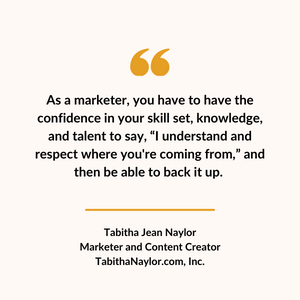 Tabitha: So it was really, really challenging. I think that going through that experience set me up for much more success in the future. Because I did experience that early on. You always have two options in life, right? Like we’re either going to cower in the corner or say, “No, you’re not going think this about me because that’s not who I am.”
Tabitha: So it was really, really challenging. I think that going through that experience set me up for much more success in the future. Because I did experience that early on. You always have two options in life, right? Like we’re either going to cower in the corner or say, “No, you’re not going think this about me because that’s not who I am.”
I really went with that other approach, and I think that that’s worked really well for me over the years with my company. Business owners traditionally have pretty big personalities as well. And a lot of times, they’re very opinionated. As a marketer, you have to have the confidence in your skill set, knowledge, and talent to say, “I understand and respect where you’re coming from,” and then be able to back it up.
I think that has served me extremely well over the years. And not every contract is great. We have disagreements, and sometimes contracts don’t work out at all. But it’s being able to walk away from something like that and say, “You know what, this just wasn’t going to be a good fit,” and not feel like you’re defeated.
Jenn: In your experience, what unique obstacles do women entrepreneurs face in business, and how can they best overcome them?
Tabitha: These experiences guided me and made me feel more compelled to do something that let’s let women know that it’s okay how we feel. Over the years, so many things have happened that I haven’t wanted to talk to people about because I don’t want them to see me as weak. I think that sometimes it’s different for men. They’re like, “Oh yeah, I screwed this one up.”
But for women, because we feel like sometimes, we are scrutinized through a different lens, it’s more difficult for us to say, “You know what, like, yeah, I screwed this up.” To have emotion as it relates to your business, then it’s like, “Oh, she’s just an emotional woman.” People are more dismissive that way. And I think that sometimes it’s very difficult to operate under that facade.
Jenn: Did you see a change in how your business had to operate during the pandemic?
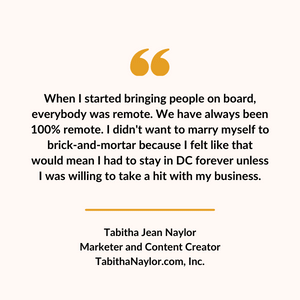 Tabitha: During the pandemic, for us, that was tough. In situations where there’s economic uncertainty, it’s a knee-jerk reaction.
Tabitha: During the pandemic, for us, that was tough. In situations where there’s economic uncertainty, it’s a knee-jerk reaction.
For the most part, people are automatically going to pump the brakes on their marketing, even though it’s the worst thing you can do. It is one thing that it’s just like it’s like clockwork. Most people just wanted to pump the brakes on marketing. So we saw a substantial drop in revenue as soon as the pandemic hit.
That was tough because I was working from home when I started. At the time, I was living in the Washington DC metro area and didn’t like living there. So I knew that was never going to be my forever home.
When I started bringing people on board, everybody was remote. We have always been 100% remote. I didn’t want to marry myself to brick-and-mortar because I felt like that would mean I had to stay in DC forever unless I was willing to take a hit with my business.
It was interesting when the pandemic happened because I had almost a decade of experience working and managing a team remotely. For other agency owners and friends of mine who had businesses, I tried to be as helpful as I could in helping them understand some of the challenges they’d have.
And how you manage them and how to overcome some of those setbacks. Because so much is just about trying things, and they don’t work. And when they don’t work, we pick ourselves up. We’ve dusted ourselves off. We take our life lessons, apply them, and move on.
Jenn: You mentioned bringing on a team; what challenges did you find did you face when you were onboarding or even selecting your team?
Tabitha: One of the biggest things for me was when I first started hiring, I was hiring everybody as W-2 employees. We work in Creative, right? So what was happening is I was bringing people on board, great talents and everything. Things would be good for about three to six months. Then I started to notice a drop-off in terms of the quality of deliverables and communication. In other words, we’re missing some deadlines, or we weren’t doing that before, and it was literally like clockwork.
In this remote type of scenario, I found that when you’re working with creatives, they become very comfortable with that base salary and everything. But then they start picking up side projects. And those side projects traditionally have shorter turn times in terms of deadlines and things like that. Now, all of a sudden, they’re trying to split their time. But these other side projects have tighter deadlines, so they focus more on that.
After about two years, I decided I won’t hire W-2 employees anymore. So everybody who works for me is a 1099 contractor. That way, they have the freedom and the flexibility if they want to pick up side projects.
Jenn: Can you tell me about how you serve your clients and what aspects you focus on the most as a marketer?
Tabitha: We have a very good client retention ratio because I believe the whole premise of we underpromise and we over-deliver. I’m very OCD regarding the quality of the deliverable we provide to our clients. And I’m a big proponent of collaboration and communication.
Whenever I talk to a potential new client, I always say, “Listen, if you’re looking for something that’s just going to be set it and forget it, I’m not the marketer for you. I can give you recommendations of a few agencies that I trust and know will take very good care of you. But that’s not us.”
I believe in collaboration, I want to have that communication because I need to know what’s going on with the business. That way, we can try to bake that into the work that we’re doing so that we can be more effective. I believe that transparency in terms of communication and collaboration equates to much better results.
Jenn: What best practices do you follow that differentiate you from other marketing agencies?
Tabitha: I think business owners who remain engaged with what’s going on really help move the needle. When they’re not engaged, it’s very difficult for us to be effective.
I don’t lock people in contracts, either. If you’re unhappy with how things are going, we’ll have a couple of meetings. We’ll try and figure out the root cause. We’ll try to have a meeting of minds. Then, we’ll give it another 30, 45, 60 days. And if you’re still unhappy, the last thing I want to do is, have somebody as a client who hates us, right? Who doesn’t like the work we’re doing and hates us even more because they’re stuck paying us because they signed a 12-month contract, and they still have three months left?
As a marketer, I don’t think that that’s good for my business. Is it good business, in general? Of course, because it’s predictable revenue. But from a business-to-business standpoint and a human beings standpoint, I don’t believe in that kind of stuff.
My dad’s side of the family owns hardware stores. And my great-granddad opened the first one in 1884. And it’s still there. It’s in very, very rural Western Maryland. And it’s a bedrock of the community. I grew up seeing how a small business impact can have a trickle-down effect in a community.
Jenn: Can you tell me a little more about that?
Tabitha: What really got me excited was thinking about my upbringing and the hardware store. I like the feeling that I get from working with small businesses. If we do a really good job for them, they grow. As they grow, that means they’re hiring. If they’re hiring, that means that they’re putting more good things out in their local community.
And, like they said, it has a trickle-down effect that can really impact lives. And that was one thing I liked the most about working at PNC Bank. You were just a number. You were a cog in a machine. It didn’t matter whether you were there or not at the end of the day. You didn’t feel like you mattered.
With the work that we do, I know that it does matter. We bring on clients that buy into this approach; this concept of collaboration equals results. The results equate to better brand awareness, phone calls, and leads. More leads and more phone calls translate into more business. More business turns into more revenue. And more revenue turns into growth.
It’s really that holistic approach to where we can impact businesses, and I think that that really important. Small businesses are the backbone of this country. It was hard to see the shutdowns through the pandemic and how much people were suffering. I did a lot of free consultations, but I wasn’t getting anything out of them. I knew that these businesses didn’t have money to invest in a marketer.
But I was trying to chart them on a better path. Instead of saying, “We have no budget, so we can’t do anything,” I said, “You can always do something.” If you don’t have money, you invest the time.
Jenn: From what you’ve described, you have very high standards for quality and things like that when it comes to deliverables. When you’re assessing someone who is going to be a contractor for you, what key elements are you looking for in their writing portfolio, websites, or other collateral that they present to you?
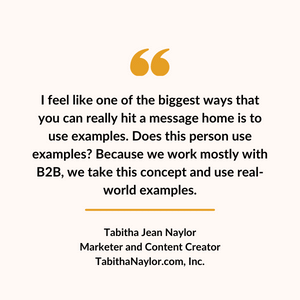 Tabitha: One of the biggest things for me is attention to detail. If I’m looking at a website, are there weird spacing issues? Are the features working? If I click on your social media icons, am I being taken to your actual social media accounts, or is it a broken link? Regarding design, are things symmetrical? Do things logically make sense when you’re reading through them?
Tabitha: One of the biggest things for me is attention to detail. If I’m looking at a website, are there weird spacing issues? Are the features working? If I click on your social media icons, am I being taken to your actual social media accounts, or is it a broken link? Regarding design, are things symmetrical? Do things logically make sense when you’re reading through them?
One of the biggest things I noticed, especially on the content development front, is things not making logical sense. Does this content take me through a journey? Does the introduction set everything up? Is there a strong call to action?
I feel like one of the biggest ways that you can really hit a message home is to use examples. Does this person use examples? Because we work mostly with B2B, we take this concept and use real-world examples. Now we’re taking a concept, and somebody who knows absolutely nothing about this topic can walk away and have that aha moment. And it makes sense.
Jenn: What’s your take on AI and its use in the content creation process?
Tabitha: The internet is like an endless supply of information. You can pretty much research anything you want. But there’s a difference between writing about something and understanding it. It shows in the quality of the deliverable if you understand what you’re writing about. There’s this element of what that end deliverable looks like.
That, I think, speaks to the end reader so much more. And is it that type of quality? Especially when you’re integrating all of this with AI, right? And people are using ChatGPT, Jasper, and Google’s Bard. And it’s a struggle for me at this point. Because I’ve got clients who ask, “Well, why don’t we just use ChatGBT?”
I’m not opposed to using AI. I was for the longest time because I completed a copywriting apprenticeship when I was younger. So my initial reaction was, “No, I’m not going to use something that’s going to artificially create content.”
As a marketer, I think that AI does bring certain elements to the table because it shortens the runway. But we don’t create things in any less time. What it does is it gives us a foundation to work off of, and then that frees up our time to where we’re not necessarily racing against the clock.
But we have more time to really sit down and marinate and think about it. That way, the quality of what we’re producing speaks to that end reader.
Jenn: How do you feel that SEO plays into all this? Do you feel like you’re challenged by it? Or do you feel like your team has a firm grasp on how to handle it?
Tabitha: I think that we have a pretty good grasp on it. The thing with SEO is it’s like it’s constantly changing. Do we stay on top of things? Yes. But at the end of the day, we write for humans; we wrote for human beings first. Everything else is secondary.
As a marketer, I’m a firm proponent that you only get one shot you have one shot to make a good first impression. And if it’s something that’s written specifically for SEO purposes, yeah, maybe somebody found it because it ranks really well. But what about all those people that found it not because of SEO, right?
The quality isn’t there if it’s not engaging or informative. Or if you’re not learning something from it or not feeling compelled to do something with that piece of content. If it was written more for SEO purposes than anything else, it’s a missed opportunity. So ever since day one, it’s always been we write, we produce for human beings first and foremost.
About Tabitha Jean Naylor

Tabitha Jean Naylor is a highly qualified and experienced marketer with a passion for excellence. With a focus on delivering effective and ethical campaigns, Tabitha’s expertise lies in providing comprehensive marketing solutions that increase brand awareness, generate quality leads, and drive sales revenue.
She takes pride in being approachable, detail-oriented, and results-driven, delivering high-quality services that produce tangible results. Tabitha is also the founder of Women Entrepreneur’s Can (#WEcan), a digital magazine aimed at supporting women in overcoming the unique challenges they face in business and providing them with the knowledge necessary for success.
